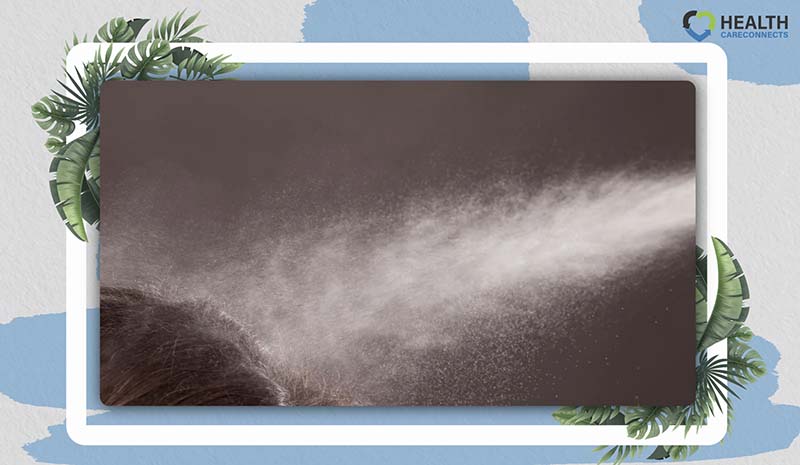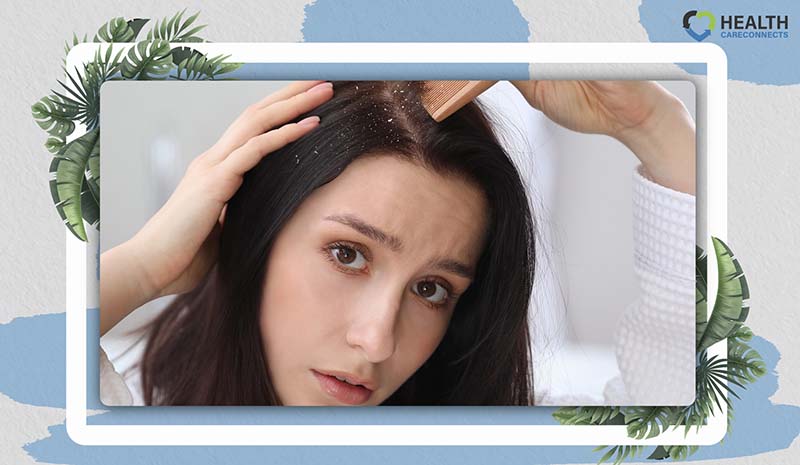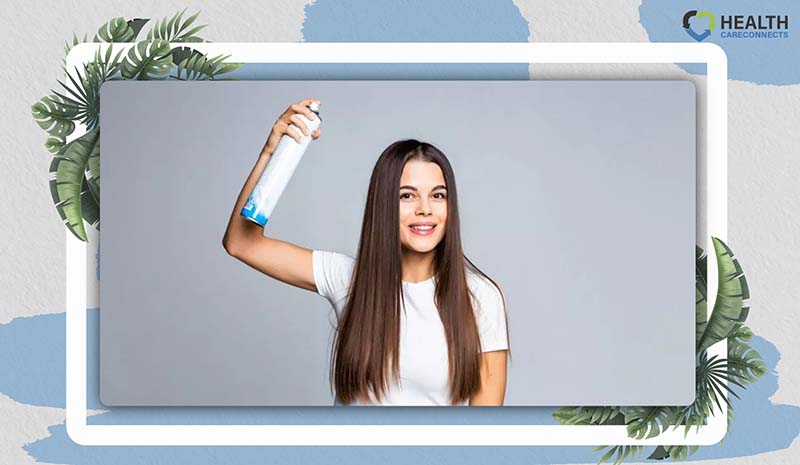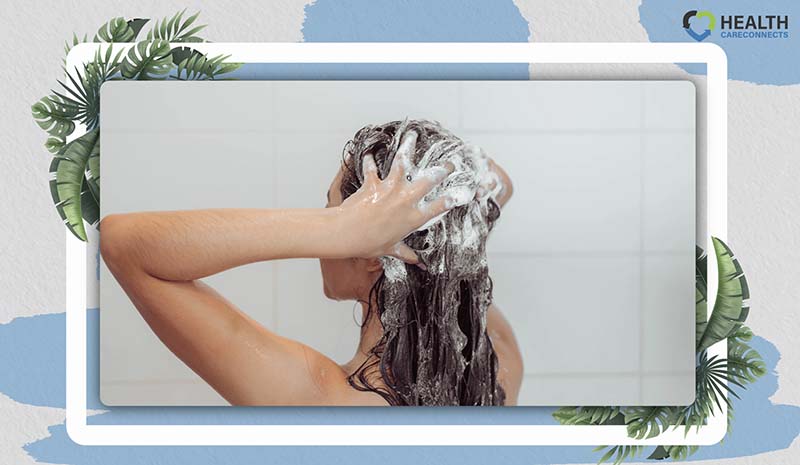Is hairspray bad for your hair? This question is common among stylists and those who use hairspray regularly to enhance their hairstyles. Hairspray is known for its ability to add volume and shine, making hair appear vibrant and full.
Despite its benefits, concerns arise, especially for individuals with thin hair or those experiencing significant hair loss.
Research suggests that the long-term use of hairspray may contribute to hair damage. Read on to discover more about the potential effects of hairspray and find out how to use it safely.
Is Hairspray Bad for Your Hair?
Hairspray, when used excessively or frequently, can have detrimental effects on your hair.
The alcohol (ethanol) and polymers in hairspray can coat your strands, leaving them dry and brittle. This increased fragility makes your hair more prone to breakage, especially during brushing or styling.
If your hair is already damaged, hairspray can further weaken it, leading to increased hair fall.

Potential Downsides to Using Hairspray
Hairspray commonly contains ingredients like alcohol and polymers that are chemically modified to be flexible and quick-drying. These ingredients can have severe effects on your hair, such as:
- Ethanol Damage: Hairsprays with ethanol can damage hair and irritate the scalp. Alcohols like cetearyl alcohol, stearyl alcohol, and cetyl alcohol are included to counteract some of these effects, but they are not always sufficient.
- Build-Up and Flakes: Continuous use of hairspray can cause build-up on your scalp, leading to dandruff-like flakes. While not true dandruff, this flaky substance can make your hair and scalp appear dry and unhealthy.

- Dullness: Polymers in hairspray bond and coat the hair to hold styles in place. With excessive use, this can make your hair look dull and lifeless.
- Allergic Reactions: Some people may be allergic to the chemicals in hairspray, resulting in scalp itching and inflammation. Always monitor your scalp for immediate reactions after applying hairspray to determine if it is suitable for you.
Benefits of Using Hairspray
Hairspray is an excellent tool for managing flyaways and ensuring your hairstyle stays put throughout the evening. To boost volume, try spraying hairspray beneath the top layer of your hair and gently fluff it. Alternatively, for added lift, flip your hair upside down and apply the spray underneath.
For those looking to maintain perfect curls, hairspray is essential. After styling your curls, apply a light mist of hairspray to help them hold their shape longer. This is particularly useful if your hair tends to revert to its natural straight texture, as hairspray provides the necessary hold to prevent your curls from loosening too quickly.
Additionally, hairspray can be a quick fix for oily hair. If you’re caught without time for a wash but need to look presentable, simply spray some hairspray at the roots and gently lift the strands. This technique helps absorb some of the oil and gives your hair a fresher, cleaner appearance.

Instructions for Using Hairspray Properly
Before using hairspray, always shake the bottle to mix the ingredients thoroughly. Hold the can at least eight inches away from your hair when spraying. This helps distribute the product evenly, ensuring a lighter, more effective hold without overburdening your strands.
Be mindful of the amount you use; aim for a hold that keeps your style in place without making your hair feel overly stiff or heavy. For the best results, apply hairspray to dry hair. Using it on wet hair can lead to a crunchy texture, as the polymers in hairspray are more effective at binding when hair is dry.
Hairspray can also be an excellent tool for controlling flyaways. Simply mist a little on the affected areas and gently smooth the hair with your hand to tame those stray strands. Ensure the nozzle of your hairspray is clear and unclogged to maintain a fine, even mist. A clogged nozzle can disrupt the spray pattern, causing uneven application.
For people with sensitive scalps, avoid spraying too much directly on the scalp. If you’re trying a new hairspray, conduct a patch test on a small area first to check for any adverse reactions.
How Do You Remove Hairspray from Your Hair?
Numerous methods exist for removing hairspray build-up from hair, ranging from specialized shampoos to natural alternatives that don’t require washing.
Clarifying shampoos are an excellent choice for quickly and effectively eliminating hairspray residue. These shampoos deeply cleanse, stripping away build-up and enhancing the effectiveness of your regular shampoo when used periodically.
For those who prefer not to wash their hair as frequently, natural remedies like apple cider vinegar, baking soda paste, and lemon juice can be effective.
These substances break down the residues left by hairspray without the need for conventional washing. Mixing these natural ingredients into your hair care routine can help maintain clean, residue-free hair.

Tips for Using Hairspray to Reduce Hair Loss
While hairspray can potentially damage your hair, there are ways to minimize the risks and still enjoy its styling benefits.
- Choose Light-Hold Formulas: Opt for light-hold hairsprays. These formulas offer a gentler grip on your hair, requiring less product to achieve the desired style, which reduces potential damage.
- Apply to Dry Hair: Always apply hairspray to dry hair. This helps preserve the existing moisture and prevents further dehydration, keeping your hair healthier.
- Maintain Distance: Keep a reasonable distance between the nozzle and your scalp when applying hairspray. This prevents the product from accumulating directly on the scalp and potentially clogging hair follicles.
- Use Sparingly: Apply hairspray in small amounts and only where necessary. Focus on specific areas rather than coating your entire head, reducing overall exposure to potential damage.
- Cleanse Regularly: Regular shampooing helps remove hairspray build-up residue. This maintains a healthy scalp environment and promotes proper hair growth.
Is It Bad to Use Hairspray Every Day?
Using hairspray every day can be harmful because it contains chemicals. These chemicals can make your hair dry, dull, and cause itchiness and flakiness on the scalp.
To mitigate these effects, it is advisable not to use hairspray daily. If you do use it regularly, ensure you follow a proper hair care regimen to protect your hair.
Conclusion
Is hairspray bad for your hair? Not necessarily, if you apply it correctly and choose the right products. You need to research the ingredients in hair products to find the ones that best suit your hair type and needs.
Moderation is key when using hairspray, as overuse can cause damage. Regularly washing your hair to remove any residue and using moisturizing and nourishing shampoos and conditioners are crucial steps to maintain healthy hair.
For those seeking more information and honest product reviews, I recommend visiting HealthCareConnect.

Dr. Joyce Slater: Your Guide to Informed Health Choices
Dr. Joyce Slater shines as a distinguished expert in the field of nutrition and public health. Contributing her vast expertise to HealthConnectbc, she embodies a deep-seated passion for enhancing public well-being. As a respected figure in her field. Dr. Slater’s academic journey and professional achievements are nothing short of inspirational.
Holding a significant position as a researcher and educator, Dr. Slater has delved deeply into the intricacies of food literacy and nutritional science. Her work, prominently featured in numerous esteemed scientific publications, underscores her dedication to expanding our understanding of food’s role in health and society.
At the heart of Dr. Slater’s professional ethos is a profound desire to positively impact individual lives through education and research. She often says, “Empowering people with the knowledge to make healthier choices is the most rewarding aspect of my work.” This principle is the cornerstone of her involvement with HealthConnectbc, where she strives to provide reliable and practical health advice.
Dr. Slater’s contributions to HealthConnectbc are multifaceted: academically, she offers insights into the complex world of nutrition and health, enhancing both public understanding and professional practices. Additionally, she is instrumental in guiding and inspiring the next generation of health professionals, thus fostering future excellence in the field.
Juggling rigorous research with her educational duties, Dr. Slater demonstrates an unwavering commitment to her profession. Her approachable nature and genuine concern transcend the confines of academia, touching the lives of everyone she interacts with. Dr. Slater looks forward to continuing her journey of discovery and education, dedicated to the ongoing improvement of public health and nutrition.
At HealthConnectbc, Dr. J. Slater is not just a contributor; she is a guiding light, dedicated to enlightening and motivating individuals towards a healthier and more informed lifestyle.
PUBLISHED ARTICLES
- Food literacy competencies: A conceptual framework for youth transitioning to adulthood (2018)
- Self-perceived eating habits and food skills of Canadians (2016)
- Challenges to acquiring and utilizing food literacy: Perceptions of young Canadian adults (2016)
- Socio-demographic and geographic analysis of overweight and obesity in Canadian adults (2009)
- Sustainable well-being: Concepts, issues, and educational practices (2014)

